2022 Week 1: Non-profit Management
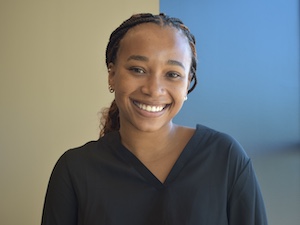 Genesis Aire | Public Justice Center
Genesis Aire | Public Justice Center
I’ve been looking forward to this week for months. Selecting my placement this summer differed from last because I was able to do my own research and reach out to CIIP alums for their input. Based on my conversations, I was certain that I would have a memorable and informative experience at the Public Justice Center this summer. Hopping onto the circulator Monday morning, I was greeted by the familiar faces of the CIIP cohort, including one of my mentees. Seeing them helped calm some of my first-day nerves as I took the trip to the PJC. My first day was in person despite most of my work from then on being remote/hybrid. We went over the orientation materials, set up my laptop, and went through a racial equity workshop before I was able to head back home for the day. One of the first things that stuck out to me about the PJC was the people. As Sabrina let me know, most people chose to work remotely, the Housing Project was the exception since they have a lot of paper files to work with. The office was mostly empty, save for names on the door and a few personal items left in their individual spaces. The next day, I was the sole intern headed into the office to meet my supervisor. Since I’m the only intern who isn’t currently in law school, my schedule will differ from the other two. Matt gave me a rundown on what he’s working on with the Housing Project, then laid out a few tasks he wanted me to complete this week, and then an overall assignment for the end of summer. I’ll be giving a presentation to Baltimore Renter’s United (BRU) at the end of the summer, and then submit an additional memo/paper to him. The additional paper request to him delightfully surprised me because I’d never really heard of a paper being used in a professional setting. I think we’ve all experienced varying levels of imposter syndrome at this point, it’s especially prevalent on campus, but I’ve been trying to proactively soothe my nerves and affirm that I can be useful to the PJC despite having a very limited scope of knowledge on the law. Writing a paper provides me a platform I’m quite comfortable in, at this point, to dive deep into a topic and give Matt some helpful resources and information. While that project will probably be during my final week, it gives me something tangible to work towards. Furthermore, I was able to turn in my first assignment on Thursday, a fact sheet on a proposed bill, before shadowing an attorney at Rent Court on Friday morning. I did not have many expectations for court. I honestly did not know what to expect. Between 8:30 to 11, I sat in court listening to the various cases brought before the judge between landlord and tenant. I was able to watch the PJC lawyer advocate for their client’s rights, in regards to their landlord’s accusations, and get a gauge for the issues Baltimore renters were facing. Thankfully, there was not a lot of drama or serious matters that needed to be addressed, save for a couple of people unable to reach an agreement. However, just by observing court for a few hours, I learned a couple of new things and was able to broaden my perspective about Baltimore.
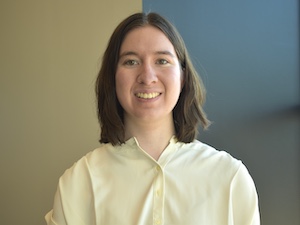 Rebecca Baxter | Corner Team, Inc.
Rebecca Baxter | Corner Team, Inc.
This week has been a relatively relaxed week for me. Corner Team’s Summer Champion’s Camp, which I will be leading the STEM lessons at, doesn’t start until July 5th, which means this week included a lot of brainstorming and planning for lessons.
One thing I’ve really been learning a lot about this week is flexibility and being willing to adapt. The initial lesson plan outline that I came up with on Monday has already changed many times after looking at resources my supervisor gave me, talking with my fellow staff members about what they think should be included in the program and listening to their feedback, actually getting to see all the supplies, materials, and space Corner Team has, and doing some of my own edits after looking it over again. As someone who likes to have a well thought out and thorough plan for everything that I do, this is little different for me because I know whatever I have planned now will definitely not be exactly what happens when I do the STEM lessons in July. However, I know that having some sort of plan and then being willing to adapt based on feedback from others and the energy the students bring to camp each day will make each lesson more successful. I feel like I am learning that being present and responding to challenges and changes as they come rather than planning everything out minute by minute is often more effective.
I also got to go to the Corner Team gym for the first time this week and it was really nice to be able to see the space I’ll be working in for most of the summer. It also got me thinking a lot about the asset-based vs. deficit-based approach that we discussed during orientation. For example, the surrounding neighborhood has one of the lowest rates of household internet access in the city, but Corner Team has used its relatively centralized location between Midway and Coldstream and its community connections to start building a shared internet network that is free to anyone in the neighborhood. After getting to see all the materials and supplies Corner Team has, many of which have been donated to the gym, I have tried to rework some of my lessons to use more of the assets the Corner Team already has. I think that is sort of the central idea of an asset based approach – looking at what a community or organization already has and seeing what you can do with that, rather than immediately pointing out what they don’t have.
I hope to carry what I have learned about flexibility and using an asset-based approach into the next week as I continue with lesson planning and prep.
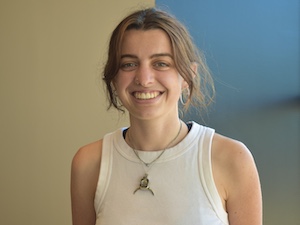 Ayla Frost | Station North Tool Library
Ayla Frost | Station North Tool Library
I have really enjoyed my first week working at the Station North Tool Library. So far it has been mostly onboarding- so getting to know the software systems, machines, the space, and the programming. My manager has been very busy, so I sometimes feel like my presence there is a drain on them, because at this point there is not a lot that I can do without a little direction. However, I have been put to work on a couple of tasks, including fixing a power washer, assembling stools, inputting items into inventory, manning the texting system, updating the website, and writing a little bio to introduce myself. I really like fixing the power washer because although it was stressful (I only had an hour before someone was picking it up) I felt really excited/honored to be trusted with this task. I really enjoyed being given a pretty simple task that I was unfamiliar with and sitting down, googling instruction manuals watching youtube videos until I worked it out. I think I’m realizing I really enjoy that type of learning.
One thing that has been really interesting for me this week has been learning about the history of the building and the underlying relationships/power dynamics going on there. The building they are located in houses the Tool Library, artist studios, and a bit of a gallery space. It was recently listed for sale without prior notice to artists (and tool librarians) who used the space. It was eventually sold to a nonprofit that promised to keep the space affordable for artists to use, but the uncertainty of a new property owner did cause many artists to look for another place. They are also doing a number of fire code improvements, which although obviously important, may threaten to increase the price of working there. This whole thing follows a wave of property developers purchasing buildings in the arts district to ultimately renovate and profit from. This moment ties into a history of cycles of gentrification and relocation in Baltimore. I feel like I am situated at a tenuous moment in the earlier stages of gentrification for the arts district, and the complex dynamics of property ownership and intentions are visible in my daily life at Station North Tool Library.
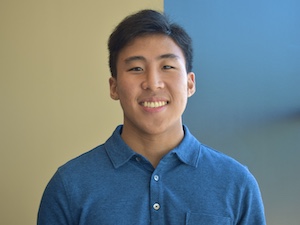 Neal Lim | Baltimore Urban Baseball Association
Neal Lim | Baltimore Urban Baseball Association
This week, I had a great time entering the world of nonprofit work with my partner, the Baltimore Urban Baseball Association (BUBA), and its founder, Andy Weltlinger. I met some wonderful Baltimoreans and even tried Haitian food from Cross Street Market in Federal Hill! Here is a principle I learned this week:
Small actions are not insignificant.
I don’t think that I came into this internship program or my work at BUBA with high expectations, but I definitely came in with the desire to perform impactful and noticeable service in the Baltimore community. I wanted to get to know community members, help them in any way I could, and help turn BUBA into a beast of a non-profit.
This week, however, I’m not sure if I did anything close to what I had in mind coming in. The most interaction I had with athletes was a few pleasant conversations I shoehorned in while I helped them register for BUBA facility memberships. From these short conversations, I was able to learn these athletes’ names, where they were from, where they went to high school, and how long they were playing baseball.
The assistance I provided to these athletes seemed pretty insignificant in my mind, too. I helped this one athlete record videos of his workout or warmup routine for his Instagram reel every time he came in to use the facility. I also learned how to operate and feed a pitching machine to chuck balls for an athlete’s batting practice session. But the most direct and frequent service I provided these athletes was helping them sign up for BUBA facility memberships.
When I felt tempted to feel disappointed that none of these actions felt significant to me, I reflected on Andy Weltlinger, who did all of this and so much more. I have no idea how he balances running this organization all by himself and making time to greet athletes, practice catch with them, and learn their names, but these interactions and relationships must be significant if it causes him to take a break from managing BUBA. None of these actions are insignificant to him, so they shouldn’t seem insignificant to me, either.
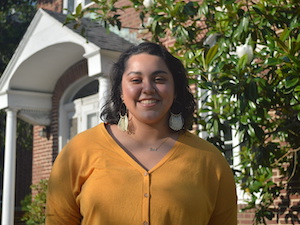 Amira Rady | Fusion Partnerships
Amira Rady | Fusion Partnerships
I spent a lot of this week with Fusion learning about fiscal sponsorship and what role my community partner plays in helping to secure funds for so many ongoing projects in Baltimore. Something that poses difficulty for so many of our partners operating as nonprofits in Baltimore is that not all of them have non-profit 501c3 status; this allows an organization to operate as a tax-exempt body recognized by the IRS and capable of receiving donations. I attended a webinar this week on state registrations for fiscal sponsorship, and found that any organization that collects donations or has a “Donate” button on a website of theirs should be registered with their state to be receiving such donations. The state filing process can be quite difficult as different states have different requirements; although Maryland is not the strictest state when it comes to state registrations, it is definitely a process requiring much time and energy on an organization’s part. A lot of the webinar used lingo I didn’t quite understand yet, but what I did pick up is a better understanding of the role Fusion plays in our community. From the outside, it may look like a lot of cutting checks and filling out applications, but what they are doing is economically mobilizing the amazing organizations in Baltimore so that they can continue to fund the important work they are doing. Like we heard during orientation, money matters. Grant making and being able to receive funds from private organizations as well as the government is crucial to maintaining a nonprofit. I truly have a newfound respect for the work that my community partner does and hope I can help Fusion’s partners to leverage their assets to secure the funds they need with a little more ease.
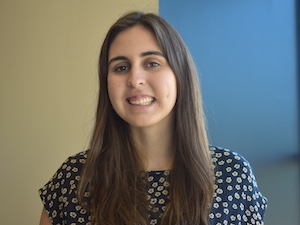 Jane Slaughter | Impact Hub
Jane Slaughter | Impact Hub
It’s hard to believe I have only been at Impact Hub a week! It certainly feels like I have hit the ground running here, as I entered the Hub in the middle of planning two huge events for Friday, June 24th. The first is a Small Business Mini-Summit throughout the day, followed by an evening celebration for the alumni of the Empower Baltimore program, a 6-week cohort program that helps small business owners to create or revamp their websites. Both events are both very different, and it has been very interesting to learn what goes into coordinating different vendors, event timelines, contacting different panelists, and compiling supply lists.
When I first started on Monday, I felt pretty left out of the event planning side of things, and instead was doing a lot of different reading material to familiarize myself with some of my more own going writing projects. While this was useful, I really wanted to get more involved with the more urgent needs of our June 24th event coordination. I think one of my supervisors recognized this, and gave me a list of different moving parts within the event that I could run point on for the next two weeks. While this has definitely felt like a lot of information all at once, I think I have realized how much I like a fast paced work environment where there is always another project to work on. I much prefer being thrown in the middle of planning and adapting quickly, rather than a slow onboarding process. I think this way, I have gotten to know the Impact Hub team and the space a lot better and faster! I also really value the team aspect of Impact Hub. It truly feels like a community that really supports and respects one another. The team has all been very welcoming and nice, and I truly value the wonderful work environment that has shaped my first week, and I hope will also shape the rest of my summer.
